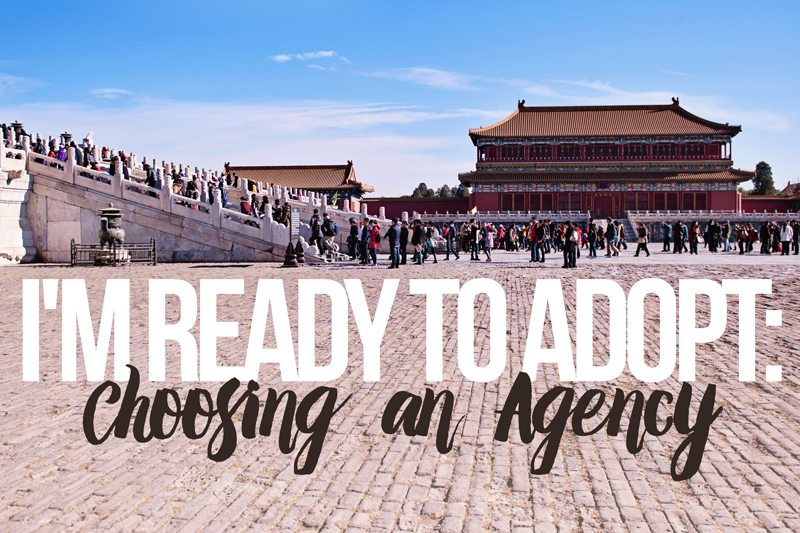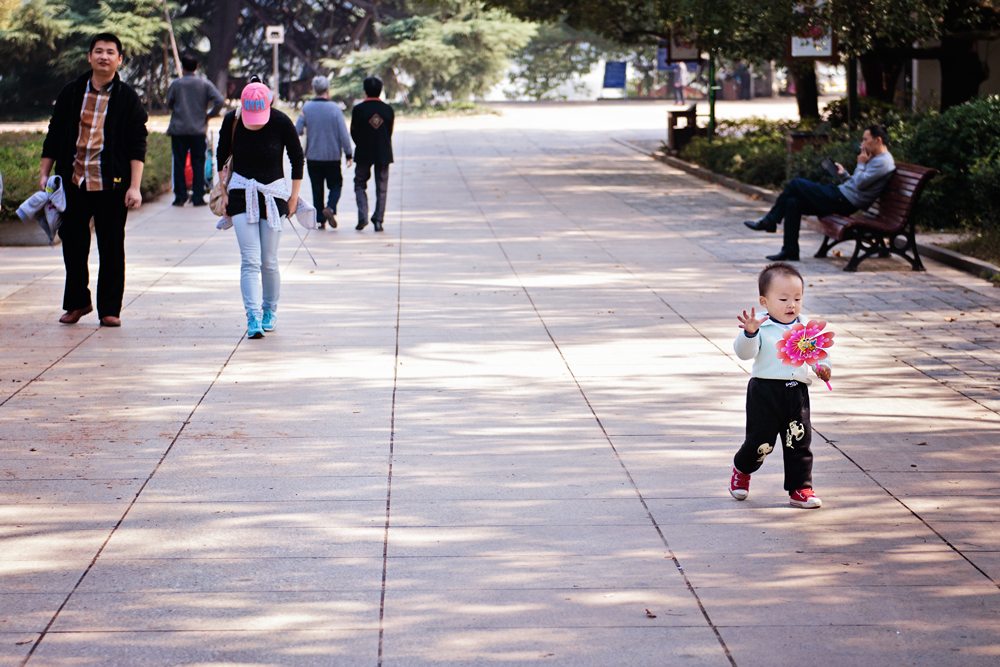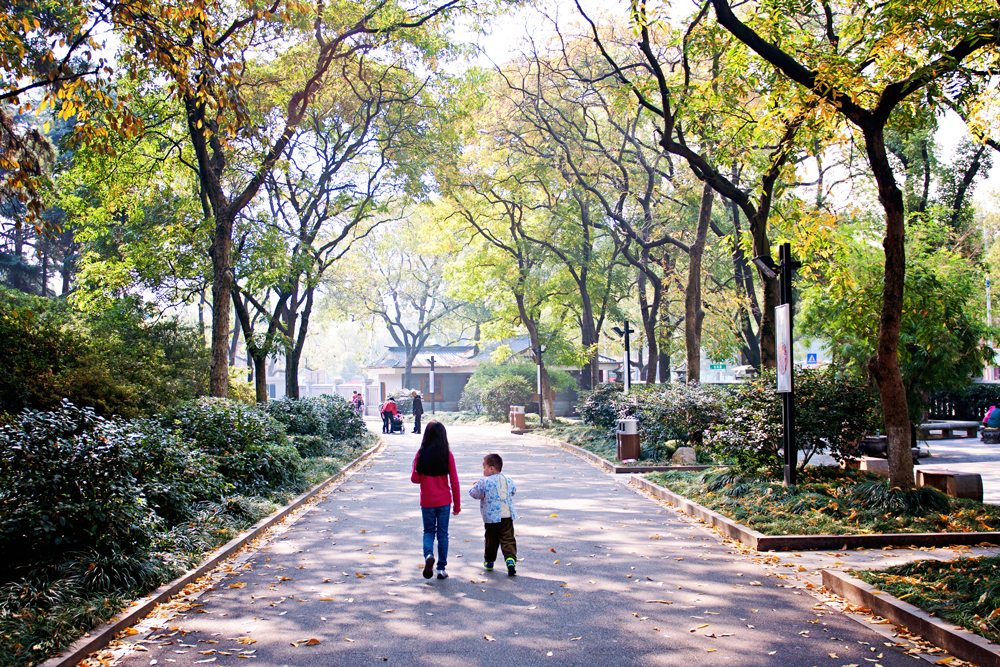Today we’re back with our I’m Ready To Adopt series with the sixth in a 10 post mini-series by Kelly – who blogs at Mine In China – on How To Choose An Agency. You can find links to the previous posts here.
Asking Agencies About Special Situations
If you would like to adopt from China, you need to fit three sets of criteria: China’s, your placing agency’s, and your social worker’s. Some of these you can work around and some you can’t. Often, choosing your placing agency carefully can help you with these issues.
China Criteria
China really has only one unbreakable rule for their special needs adoption program and that is that both parents must be 30 years old. You never knew you’d be looking forward to your 30th birthday so much! Some agencies will not let you even begin your homestudy until both parents are 30, but others will let you begin at around 29.5 so that you can mail your dossier to China on your 30th birthday. This will shave a good six months off your wait time, so be sure to ask prospective agencies what their policy on this is.
All of China’s other rules are more like guidelines. They are generous in granting waivers, but some agencies are more willing to ask for waivers than others. It is important to get opinions from multiple agencies before giving up! Many families are now home with their adopted child(ren) who were initially told no by one agency, but found another agency who was willing to ask for a waiver.
Age: In Asia there is a long tradition of grandparents raising their grandchildren while the parents work. For this reason, while China is strict on the lower age limit they will allow older parents to adopt even into their early 60’s. It greatly depends on the parents’ health, ages, and the age of the child. Older parents are more likely to be approved for older children.
Health: Mental health issues can be an issue when adopting from China. Recently changes were made to the criteria which differentiates between more severe mental illness and more moderate conditions which are controlled by medication. Similar distinctions were made for health conditions such as cancer or transplant.
Income and family size: China has traditionally been very generous with these waivers and recent changes included cost of living to be taken into account when calculating income as well as did away with any family size limitation. If you have a large family, you are more likely to run into an agency who takes issue.
Agency Criteria
You might be surprised to find that agencies often have additional criteria beyond what China requires. Some agency criteria is based on the religious affiliation of the agency while others are based on what the agency feels will lead to the most successful placement outcomes and the fewest adoption disruptions or dissolutions. Here are some of the issues you might want to ask an agency about in advance.
Marriage and social issues: It is possible to get a waiver from China if the couple has more than the allowable amount of divorces in their history but placing or homestudy agencies may have different criteria. If you are an unmarried female co-habitating with a partner, some agencies may decline to work with you because they feel it is important for children to be placed in families with parents who are married. A few agencies will require a statement of faith, meaning you sign that you share their protestant Christian views. If you are not Christian or a non-mainstream Christian (Jehovah’s Witness, LDS, etc.) you will more than likely be turned down by these placing agencies.
Family size: There are plenty of large adoptive families but there are also many social workers, agencies, and even states who want to establish a cap beyond which no family may adopt. If you have a choice of homestudy agencies, try to preview social workers to see if they are prejudiced against large families. Placing agencies vary, so shop around.
Pregnancy: Some agencies will require that you put your adoption on hold if you become pregnant during the process. This means that if you have already been matched with a child, you will no longer be able to adopt that child. Other agencies may be flexible or not care at all.
Considering the number of children and age range:
You should try to think ahead when your social worker is preparing your homestudy. It is very common for people to have their homestudy written for a girl with minor needs under the age of two. And then they decide to be open to a boy, or fall in love with a 4 year old girl, or decide to add a second child. Any changes to your homestudy will involve getting a homestudy update and filing a supplement with USCIS, costing you hundreds of dollars. You do not want to be out all of this money because you are approved only for “under two” and you accepted a referral who was 2 years and 2 months old. Have your social worker write your homestudy as open-ended as possible. Be approved for either gender, two children, and as old as your social worker is comfortable with. This costs you nothing and makes no commitment on your part.
Adopting two at once:
Not all placing agencies will allow parents to adopt two unrelated children at once, although China does not have a problem with this practice. If you know in advance that you would like to adopt two children, ask potential agencies if this is something they support. If so, ask if they offer any reduction in fees for adopting two at once. Some agencies do not reduce the fees because there is no reduction in paperwork and working hours on their end, while others do substantially reduce their fees.
If you are approved for two and only adopt one, or even if your agency doesn’t allow you to adopt two at the same time, you might choose to reuse your dossier to adopt another child within a year. In that case you are only required to do a homestudy update instead of an entire new homestudy which will save you time and money. For more information on reusing your dossier, you can join this Facebook group. If this is something you are interested in, ask your agency how quickly you can start the process again. Some require you wait at least six months or longer before beginning another adoption.
Adopting out of birth order/artificial twinning:
Placing agencies might have concerns about the age of the child you are adopting if you have other children at home. If you adopt a child older than a child you already have at home, whether the oldest or the youngest, this is called adopting out of birth order. If you adopt a child who is within a year of age of a child you have at home, this is called artificial twinning, because you will have two children the same age. Because these practices have traditionally been considered to have a negative impact on the children by social workers, some agencies do not allow them. However, more recently social workers and parents have been questioning whether these rules need to be adhered to in a hard and fast manner. Some placing agencies are now willing to consider adopting out of birth order or artificial twinning on a case by case basis while others have no problem with them at all.
Expedited Adoptions:
If you are adopting a child who is in a life or death medical situation, or an aging out child, ask potential agencies how much experience they have with expedited adoptions. Some are familiar with this and know all of the steps involved while others may not be aware this is an option. Sometimes you will not be able to choose the agency, but if you join the China WARP speed adoption group then you will get the support you need to walk your agency through the process.
The most common cause for an expedited adoption would be if you are adopting a child who is close to aging out. Because Chinese law requires that the adoption must be completed by the child’s 14th birthday, time is often a major concern. Be sure to ask if your agency has experience with expediting the adoption of an aging out child. There are many things which can be done to make sure the adoption is completed in time. I have known people who adopted an aging out child in under 3 months from start to finish, barely making it across the finish line by finalizing the adoption in China before the Travel Authorization had been issued. Most agencies will transfer the files of aging out children so if an agency is skeptical that they could complete the adoption in time then you could see if they would transfer the file to another agency which is more experienced with the expedite procedures.
No one wants a child to lose their chance for a family because of finances. For this reason you will find that there are many generous grants available for children who are reaching the end of their opportunity for adoption. Sometimes a particular child will be offered a large grant by a private donor independent of an agency. Some agencies will reduce their agency fee by a significant amount in addition to offering a grant. Finally, many of the orphanages in China will reduce or waive the required orphanage donation in an effort to help these kids find a family. While no one should consider adopting an aging out child because it is cheaper, if you are interested in adopting a child who is close to aging out you should be aware of all of these available resources.
In her next post, Kelly will discuss different travel scenarios and why prospective adoptive parents might want to consider how agencies handle travel at the front end of their adoption, and choose their agency accordingly.





























This article was so informative, I really don’t know much about the details of adoption. My husband and I have talked about it for a while, but we are serious about it now. It’s good to know that there is a possibility that an adoption won’t go through if I get pregnant during the process, it may fall through. I’m not planning on getting pregnant again, but this is good to keep in mind.
Do you know of any agencies that are open to waiving the requirement of the youngest child in the home being at least 3 years old?